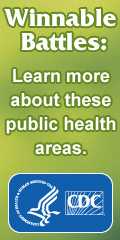Emergency Preparedness & Response
Did You Know? is a weekly feature from the Office for State, Tribal, Local and Territorial Support to inform your prevention activities. We invite you to read, share, and take action!
View the Current Did You Know?
October 13, 2017
- Three major hurricanes have hit the US so far this season, and CDC is working with health agencies in the affected areas to respond to the storms.
- Some of the major health threats after a hurricane are extended power outages, extreme heat, and unsafe food and water.
- CDC has resources in English and Spanish for health agencies, first responders, and individuals responding to and recovering from hurricanes.
June 16, 2017
- An influenza pandemic is a global outbreak of a new influenza A virus. Because a flu pandemic is unpredictable, it can occur at any time.
- Over the last 100 years, only 4 flu pandemics have occurred, but they resulted in close to 1 million deaths in the United States.
- Public health professionals can use CDC’s updated Community Mitigation Guidelines to Prevent Pandemic Influenza–United States, 2017 to prepare now for a flu pandemic.
June 2, 2017
- Many of public health’s biggest successes rely heavily on law.
- Legal interventions play a vital role in addressing emerging public health threats, such as healthcare quality, emergency preparedness, and prescription drug overdoses.
- CDC’s Public Health Law Program can provide training, guidance and information on these topics and others.
July 31, 2015
- Public health laboratory scientists are critical to identifying, tracking, and limiting [PDF-6.5MB] public health threats: from detecting toxins in water sources to helping stem the 2014 Ebola outbreak in West Africa.
- Public health labs face challenges in maintaining and enhancing the workforce [PDF-2.3MB], as they confront significant staff losses and limited capacity to train workers.
- Laboratory scientists, leaders, and trainers can adopt and implement recently published competency guidelines [PDF-1.4MB] to strengthen their workforce.
December 14, 2012
- Global Disease Detection (GDD) Regional Centers help host countries build on-the-ground capacity to detect deadly outbreaks in accordance with International Health Regulations.
- GDD Regional Centers supported 242 outbreak responses [PDF-5.6MB] across 20 countries in five continents last year, most within a span of 24 hours.
- CDC’s global health videos highlight our work with partners around the world to control health threats and protect the health of Americans at home and abroad.
September 14, 2012
- Older adults are at greater risk for illness and death [PDF-354KB] during an emergency.
- During National Preparedness Month, states and communities can review their emergency preparedness plans to ensure they meet the needs of vulnerable older adults.
- New CDC resources are available that can assist states and communities in planning for the needs of the elderly.
August 12, 2011
- An estimated 240,000 water main breaks occur each year in the United States, many of which result in boil water advisories to ensure safe drinking water.
- The newly released Drinking Water Advisory Communication Toolbox can help you plan for, develop, implement, and evaluate drinking water advisories.
- Water advisories also impact hospitals and health care facilities. See CDC’s guidance for health care facilities to maintain continued operations in the event of a water advisory.
July 1, 2011
- Up to six major hurricanes are predicted for 2011: get prepared and be informed.
- Only 44% of American households have an emergency plan; health departments play a role in providing localized emergency response resources.
- Social media can reach millions to share timely and credible preparedness information.
Did You Know? information and web links are current as of their publication date. They may become outdated over time.
- Page last reviewed: October 13, 2017
- Page last updated: October 13, 2017
- Content source:



 ShareCompartir
ShareCompartir



